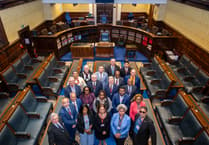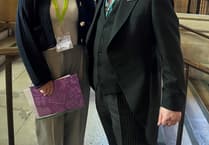The harrowing tale of a teenage girl forced to travel alone to the UK to have an abortion was told in the Legislative Council last week.
MLCs voted to grant a second reading to the Abortion Reform Bill, but hopes that the clauses stage could be taken on the same day were stymied after a number of witnesses were called - including three by Bishop Peter Eagles - to give evidence.
Before those witnesses gave evidence, former reporter Kerry Sharpe told her Legislative Council colleagues: ’Ten years ago, on behalf of the BBC, I interviewed members of the Manx public on the subject of abortion.
’I found a climate of fear and shame.’
Some women were prepared to talk, but none wanted to be identified.
She quoted a moving account from one such woman, who became pregnant at the age of 19, when she was studying for her A-levels, having previously worked in factories.
After confiding in in her sister, she went to her GP. He told her she could go to Liverpool for a private abortion.
A lack of money meant she had to travel alone.
’There were about 50 other girls there, lots from Ireland, mostly like me - really nervous, looking at the others, judging them,’ the woman recalled.
’We were all counselled before we saw the two doctors, who we had to persuade we were mentally and physically unfit to carry on. It felt like we were all on a big conveyor belt.
’But they were really nice to us at the clinic and they kept asking us, at every stage, whether we were absolutely sure that we wanted to carry on with the abortion.’
Staying in a guesthouse, alone, she felt frightened.
’It wasn’t that I was scared of the operation, I was terrified of being so alone, of the people I could hear walking along the street outside, of the other people in the guesthouse, even.
’They were all older than me. There was no pay phone, no-one I could talk to. I lay on the bed and cried.’
Right up to the actual moment of the procedure, medical staff checked she was certain she wanted to go ahead.
She praised the staff, but added: ’It doesn’t matter how nice they are, they can’t replace the people you know.
’If I’d been on the Isle of Man, my sister could have been there. I really needed familiar support and familiar surroundings that I didn’t feel threatened by.
’But at the end of the day, if you’re working class and Manx then even if you can scrape the money together to go away, no one else can afford to go with you. You’re on your own.’
The Bishop expressed concern the Bill and the debate so far had concentrated mainly on the rights of the woman and protecting her life, more than on that of the foetus.
’My question remains as to whether we have given due regard to both of those lives,’ he said. ’Not both sides of the question, but both lives involved.’
Jane Poole-Wilson said: ’I believe members of the Keys and now members of this Council are mindful of the unborn foetus.
’However, they are also mindful of the reality that for some women, they may face the most difficult situation of a possible abortion at some point after the first trimester - and that it is preferable that our law enables such women to be able to access the healthcare they need at that point.’
MLCs voted 8-1 in favour of the second reading, with only the Bishop against.
They are due to consider the bill’s clauses on June 26. There are a number of technical amendments to the bill, but the Bishop is also due to attempt some fundamental changes.
The bill as it stands will allow abortion upon request up to 14 weeks, and for prescribed reasons - including health, serious social concern and serious impairment - in the 15-24-week period, as well as set out the very restricted circumstances in which it could take place after 24 weeks.
However, the Bishop has tabled amendments changing those times so abortion upon request would be up to 12 weeks and for the prescribed reasons between 13 and 22 weeks.
He will also seek to remove one of the provisions that would permit late abortions when there was a substantial risk that, if the child was born alive, it would ’suffer a serious impairment which is likely to limit both the length and quality of the child’s life’.
An extra sitting of the Legislative Council may be called, to enable the bill to complete its third reading before the summer recess.





Comments
This article has no comments yet. Be the first to leave a comment.